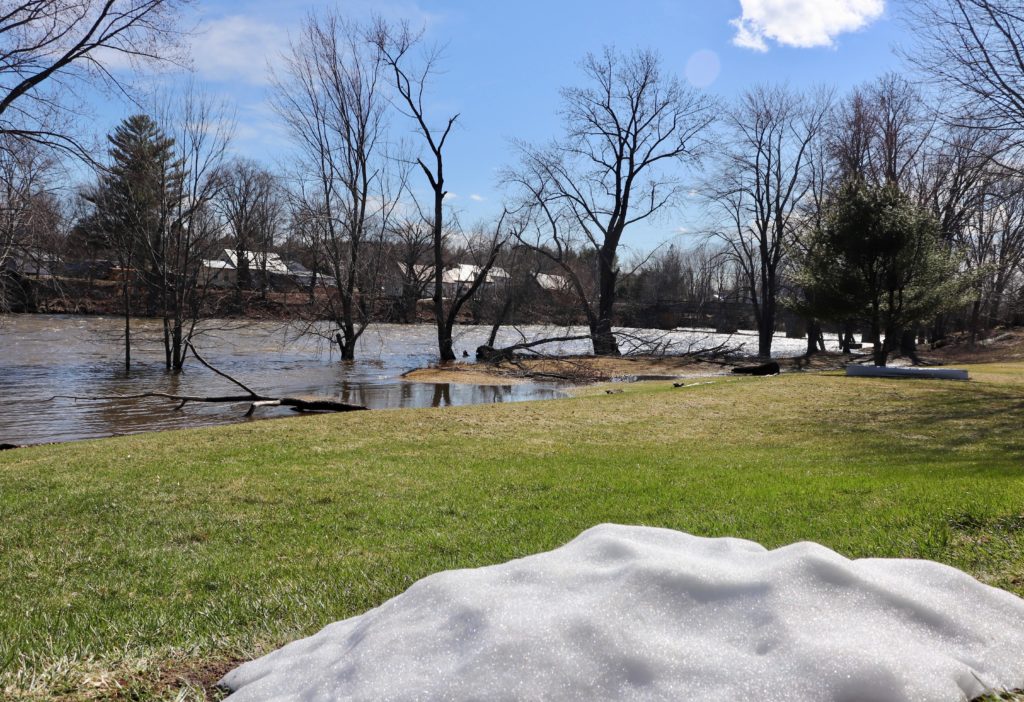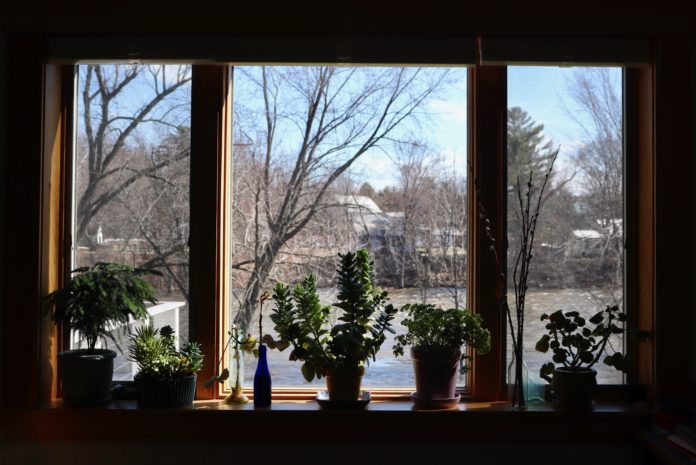As part of The Occidental’s COVID-19 coverage, we are running a series titled “Letters from” written by staff writers, editors and Occidental students. These letters aim to document the experience and insights of Occidental students as they adjust to new circumstances.
One day it snows, the next it rains. The river in my backyard bloats and settles back down again, glazes over with ice around the rocks and then sparkles wet in the moonlight. The days are short, but at night there are the stars that I’ve missed since I’ve been away. There is that kind of quiet that my ears haven’t settled into in a while, punctured by rain berating the metal roof or the occasional clump of snow sliding off it. I never realize how loud LA is until I am back home in Maine. It’s like I can feel my brain decompressing into the silence.
In the afternoons, I go for walks and bring back strands of pussy willows. I cherish the little bulbs that spot up and down the branches, as soft as the back of my cat’s gray ear. The fur keeps blossoms hidden and warm underneath until spring sheds their coats. My mom and I put them in bottles lining the ledges of our windows. We always sit looking out.
I live with my parents in Farmington Falls, Maine, a village of about 100 houses. We live five miles outside of the town of Farmington, which has a small downtown with four stoplights, including the last stoplight before the Quebec border 85 miles north. As of April 27, there are 1,023 confirmed cases of COVID-19 in Maine and 51 deaths, and rural life keeps Mainers fairly — but not completely — insulated from the coronavirus.
For us, the scariest part of this crisis is often not the sickness itself but the way that it has made surviving this winter more difficult.
After an early April snowstorm, a lot of trees fell down and caught fire on electric lines, and our house lost power and internet for four days. If I thought it was quiet when I first returned home, that was nothing compared to how silent it was without the gentle hum of our hot water heater and refrigerator. I was thankful for our gas stove but still piled extra quilts onto my bed to keep warm. I learned to work by book during the daylight and save my computer brightness for the evenings. Nights were eerie, with the three of us bumping around our big farmhouse by flashlight, feeling like characters in a Stephen King novel. Usually, during a power outage, I would just stay at my friend’s house downtown that always seems to have power, but nowadays we can’t do that.

During the storm, my dad and I rooted through our garage for our kerosene camping stove, which we set up outside to boil water. I don’t remember having used that stove since our last long trip to northern Canada to canoe and camp. For 10 summers in a row, I lived in a tent with my family, paddling between islands and icebergs. I went a whole month without seeing a person other than my mom or my dad. Sometimes I was bored out of my mind, and I was forced to learn to enjoy the simplest natural things. But even though our adventures were often mundane, in the background there were things to fear — bears, whales, whitecaps — and I remember watching my father be afraid and knowing it was time to be afraid myself.
That’s where I am at again, emotionally: bored and worried, enjoying simple things while isolated with my family.
When my readings are manageable enough, I leave my house on weekdays to make the familiar drive to my high school. The frost heaves are in the same places, and it makes me feel briefly like I’m 16 again before I remember how different I am and how strange this 20th year of mine has been. At the school, my old teachers hand me and the other volunteers bagged breakfasts and lunches. We drop them off at houses that need them, and because the majority of students in my district rely on free or reduced lunches, there is a lot of need. Some of the houses I drive to seem to burst at the seams with toys strewn about the lawn. As I spot children’s elbows through windows or knock on their screen doors, I am constantly reminded that my personal story of quarantine is not a universal story. For a lot of families right now, the normal struggles of keeping warm, putting food on the table and surviving family conflict are being exacerbated by this crisis.
When I drop off lunches or go grocery shopping, driving through downtown Farmington feels strange. To get there, I drive past an empty lot where an assisted living home used to be. It exploded in September. One man was killed and several people were hospitalized. When I got word at college, I was haunted by the stories my friends told me of where they were when they heard the sound of it, of where the school buses were. Of the flecks of white insulation that fell like a dusting of horrible snow. Back then, all I wanted was to go home, to be with my community. But I’m here now, and last week I got to be there when the last person came home from the hospital, as my community lined up in cars to honk and hold signs. I cherish that good news, a reminder of our resilience.
In these uncertain times, I cling to things that I am sure of; I take root in what is right in front of me. I notice how it feels to smile under a mask, to sing into a mask while driving. Despite everything. To hug my mom, to eat cake that hasn’t cooled yet, to be thankful for what I have. I focus on this two-step dance that the weather keeps doing between rain and snow, promising that time is still moving, that there will eventually be an end to this time of sickness.
Both we and the pussy willows will eventually shed our fur coats and step out into the world again. Whenever that may be, and whatever the world will look like then, we will have to make the best of it together.
![]()































